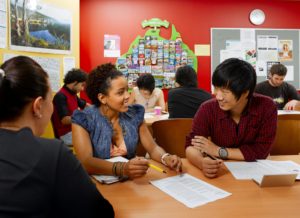Young refugee voices given a hearing
Young people from refugee backgrounds have been given a voice in identifying the barriers and issues they face as well as some solutions in an innovative new initiative.
The Global Refugee Youth Consultations (GRYC) in Australia provided an opportunity to consult widely with young people across the country from refugee or asylum seeking backgrounds.
A report produced from the consultation, titled Speaking Up: The Global Refugee Youth Consultations in Australia, presents the voices and recommendations of young people from refugee and asylum seeking backgrounds.
The report found young people face many challenges when they arrive in Australia. They needed support in learning English, accessing the education system and learning a new culture.
 If they are alone there is disconnection from family and community. They all carry with them experiences of fleeing from conflict and an often harrowing journey to get to Australia, it said.
If they are alone there is disconnection from family and community. They all carry with them experiences of fleeing from conflict and an often harrowing journey to get to Australia, it said.
“These experiences can be difficult and traumatic and all services need to have a basic understanding of these issues so they can provide the best possible services for these young people,” said the report, commissioned by the Multicultural Youth Advocacy Network and the Refugee Council of Australia.
In the report young refugees gave an insight into the clash of cultures that they experience when coming to Australia.
They said this happens at home, at school, and when accessing supports such as mental health services, the report said.
“Young people also see themselves as part of the solution, making recommendations on how they could assist others by providing peer mentoring, information, and support networks,” the report said.
The report recommended: an increase in targeted services for refugee young people, including more refugee youth and culturally specific counselling and support services; an increase in the number of community workers who have had a refugee or migrant experience in order to bridge the divide between service providers and refugee youth in government agencies and community services; and, engaging young people in genuine collaboration to assist them to shape and improve programs aimed at refugee youth.
In also recommended: engaging young people in working towards the elimination of racism, discrimination and prejudice by including young people and their families and communities in awareness-raising and information sharing about refugee youth experiences; and, support for young people to undertake community education by sharing their stories in order to contribute to public knowledge on refugee matters.
The report called on government to work with international organisations to provide better health, education and basic services in refugee camps, countries of transit and countries of asylum and provide increased support for young refugees arriving alone.
It also called for the replacement age-based determination for school level entry with a merit of skills-based measure and an increase in the provision of English language classes in schools.
“Alongside the international effort, consultations were organised with 555 young people across all states and territories to discuss with them what matters in their lives – their fears, their concerns, how they were able to settle into a new country and what they think should be improved,” the report said.
The young people, aged 15-24, came from 53 different places, some were employed, some studying for a degree, and with an equal gender split.
They were keen to share their experiences and ideas and to talk about solutions. These young people have energy, drive and vision and see themselves very much as part of the solution.
Four of these young people travelled to Geneva, representing Australia at the GRYC Global Youth Workshop, Annual Tripartite Consultations on Resettlement (ATCR), the UNHCR-NGO Annual Consultations, the UNHCR Standing Committee and a range of bi-lateral advocacy meetings.
“With a solutions focus, the consultations provided young people with an opportunity to come up with answers to the problems they outlined,” the report said.
“They talked about better access to education, and service providers understanding young people more in order to better target their services. They talked about sharing their stories and how this would increase community awareness and understanding of their experiences,” it said.
“A successful, culturally diverse society does not just happen, it requires that organisations, governments and the broader community listen to and act on what our whole community is saying, including young Australians from refugee and asylum seeking backgrounds,” the report said.
Laurie Nowell
AMES Australia Senior Journalist












